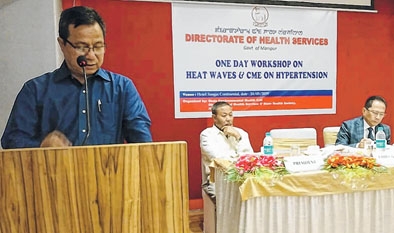Effects of heat wave on health deliberated
Source: The Sangai Express
Imphal, May 24 2019:
Director of Health Services, Manipur, Dr K Rajo Singh has stated that the State Action Plan for Climate Change, which was framed in 2013 and which underwent revisions, will now give special emphasis towards tackling deforestation and its adverse impacts.
Speaking as the chief guest in a one day workshop on heat waves and its effects on health with special reference to hypertension, which was jointly organised by the State Environment Health Cell and Directorate of Health Services, Manipur, at Sangai Continental, MG Avenue today, the Director informed that a mass scale afforestation programme will be taken up in a very systematic manner at all the Primary Health Centres (PHCs) of the State.
He said that the programme will be launched initially in the PHCs located at Andro, Phayeng, Noney, JNIMS, Kakching Khunou and Heingang and inspection works have already been completed in this regard.
|
Moreover, solar plants have already been installed in the said PHCs and they will start functioning very soon.
This will help in reducing heat production to a certain extent, he added.
Observing that heat wave is a big threat to humans, Rajo explained that heat wave is generally considered prevalent when the normal atmospheric temperature causes physiological stress or harm to the human body.
He also stated that heat wave is perceptible when the maximum temperature exceeds the average temperature by 5 degree Celsius due to the rise in temperature during four/five consecutive days.
Stating that mass scale afforestation in the State with the Government agencies, local clubs and stake holders taking equal responsibility, will go a long way towards averting the adverse impacts of heat wave and climate change, Dr K Rajo also advised the labourers, especially outdoor workers, to cool themselves using all possible means while they are working in the scorching temperature so that any unwanted effects from heat waves can be avoided.
Meanwhile, Shija Hospital cardiologist Dr Sumidra Laishram, who attended the function as a resource person, conveyed that the rise in temperature and heat wave have perilous effects when it comes to health related issues.
She said that high temperature and heat wave make it difficult to control or cater medication for hypertension as blood pressure often fluctuates in high temperature which may even result in numerous complications.
Certain studies have found that rise in temperature and heat waves increase the risk of heart attack, especially for those people with weak hearts.
Cases like heart failure increase in places like Delhi when heat wave occurs during the summer, she added.
Directorate of Environment, Manipur, Deputy Director, T Brajakumar informed that the Directorate is planning to take up a climate resilient programme in consultation with all the line departments.
He went on to assert that the State Action Plan for Climate Change, which underwent revision, will give due attention to health related issues while claiming that many health issues pertaining to the impact of climate change have cropped up in the State.
Pointing out that there was an instance of the temperature reaching 41 degree Celsius in Chandel district recently, Brajakumar contended that it is a must for the State to prepare in advance for tackling any kind of undesirable circumstances which may take place due to climate change in the future.
Chandel district and Thoubal district have already been identified as vulnerable districts in the State in connection with the climate resilient programme that will be taken up, he added.
The function was also attended by Medical Directorate Additional Director (PH) Dr Kh Sasheekumar and Department of Chest Medicine, RIMS ex-HOD Professor N Tombi as the president and guest of honour.
Many resource persons also spoke and gave slide presentations during the technical session of the workshop.








